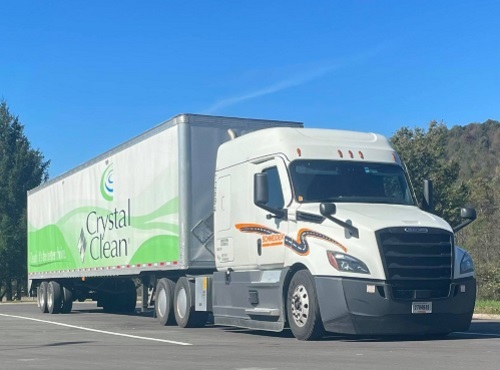The Automotive Coalition for Traffic Safety or ACTS and U.S. truckload carrier Schneider recently began pilot testing technology developed by the Driver Alcohol Detection System for Safety or DADSS program – a public-private partnership between global automakers and the National Highway Traffic Safety Administration to invent, test, commercialize, and deploy new alcohol detection technologies in a wide range of vehicles.
[Above photo by Schneider]
As part of this pilot test, Schneider will equip eight of their truck cabs with breath sensors in 2022, logging more than 100,000 sensor miles for each vehicle outfitted, for a collective total of almost one million miles. This test seeks to “refine” alcohol detection technology by testing it in real-world rough-and-tumble road conditions, while also exposing it to new types of drivers and a wider range of environmental conditions.
This Driven to Protect Initiative, in partnership with the Virginia Department of Motor Vehicles, is also helping carry out this pilot test with ACTS and Schneider.
Since 2018, Virginia has helped test in-vehicle alcohol detection technology that will determine if a driver is impaired with a blood alcohol concentration or BAC at or above the state’s applicable legal limit – and subsequently prevent the vehicle from moving.
“As a national leader in safety innovation, a collaboration with Schneider is ideal for helping expand the DADSS Program’s on-road testing, and we look forward to putting the breath system through hundreds of thousands of real-world operating miles as part of this trial deployment,” said Rob Strassburger, ACTS president and CEO, in a statement.
“This wouldn’t be possible without the support we’ve received from Virginia — the first state to step forward and conduct in-vehicle test trials on its roads,” he added. “Because of their dedication to technology and innovation, the DADSS breath system has gone from an early prototype to a viable safety feature for all vehicles in the future.”
This new pilot test also builds upon the Virginia DMV’s ongoing partnership with Virginia-based James River Transportation (JRT), which subjected such breath sensors to in-vehicle, on-road test trials for the first time – tests involving light passenger vehicles. To date, JRT vehicles accumulated over 77,754 miles and 15,020 hours of sensor operation while collecting more than 98,472 breath samples from participating drivers.
According to a study conducted by the Insurance Institute for Highway Safety in 2020, when widely deployed in all vehicles, such alcohol detection systems could help eliminate the number one cause of fatalities on U.S. roadways and save more than 9,000 lives each year.
 Nation
Nation
Georgia DOT to Lead National Connected Vehicle Study
February 13, 2026 Nation
Nation

